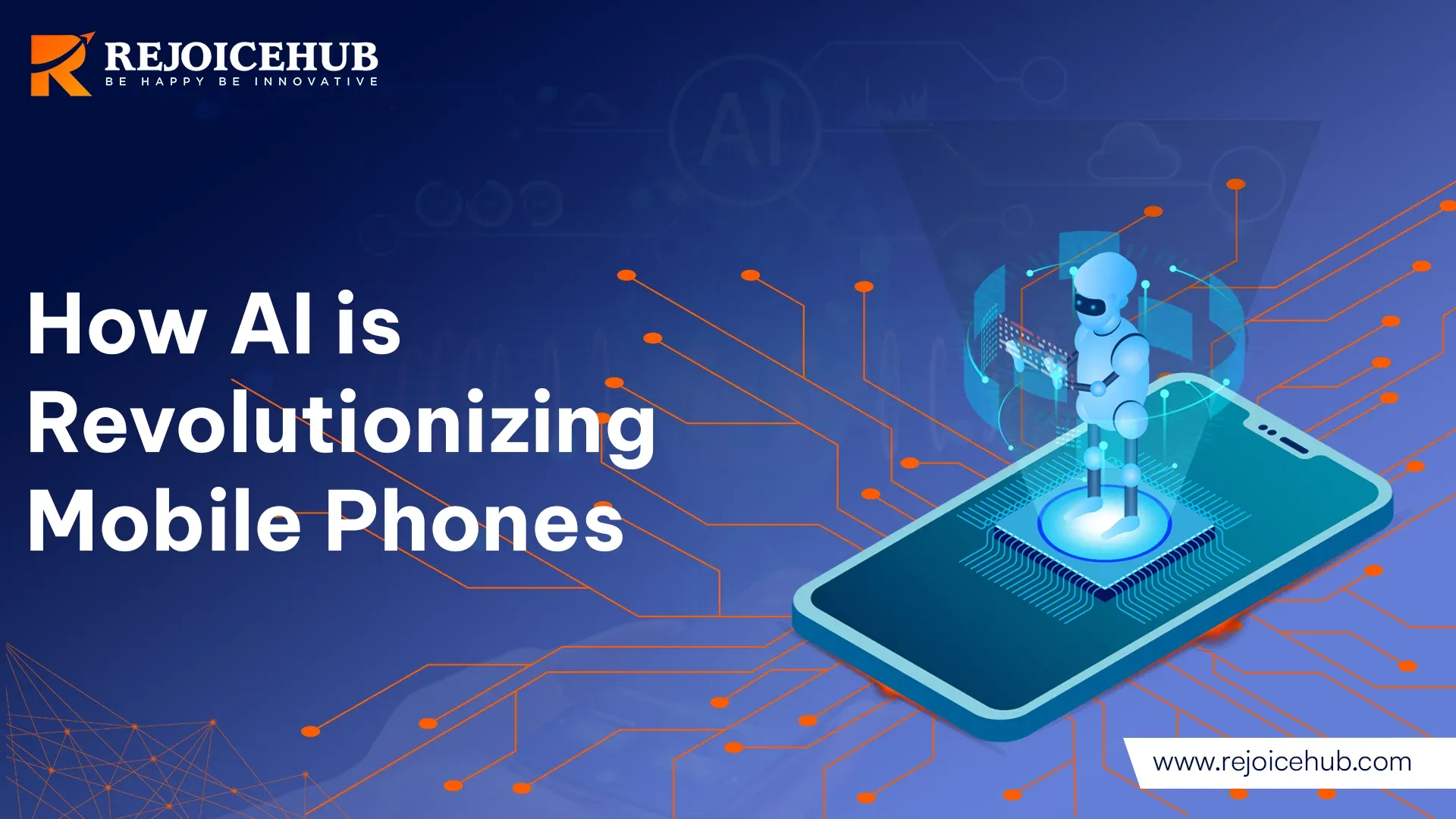
Smartphones have seen a lot of advancement in the last 10 years, and in today's easily connected world, smartphones have become smart and intelligent gadgets for humans. Phones were designed to make communication easy. Obviously, Frank Canova and IBM would never have thought that the smartphone that they created would become so advanced in 2025 that the whole world would feel small. Today, anyone can collect any information from around the world in just one second, and even banking, software transfers will become quite easy. If you think that only the latest touchscreen is advanced, then it is not so at all because, in a way, Nokia keypad phones were also so advanced in their time, as they too were compact and came with multiple features.
Today's smartphones are also a kind of multifunction tool which have been converted into advanced devices with the combination of the Internet and AI. The biggest reason behind so much advancement and the capabilities of smartphones is the intelligence of the AI models.
Due to AI, most smartphones have features ranging from facial recognition to predictive text to advanced photography and personalised recommendations. There is so much demand for AI capabilities in the market that the Samsung Galaxy S25 series has been launched with advanced AI tools and features. If you are also wondering what impact the advent of AI has on smartphones, how it works and how it is changing the communication industry, then let us try to know this in this detailed article today.
Quick Summary
If smartphones are called the biggest revolutionary gadget of the last 10 years, then it will not be wrong at all because smartphones have become the most important gadget for today's generation. Whether we look at urban cities or rural villages, smartphones have become an important part for everyone because today's advanced smartphones are used for many things apart from communication, and smartphones have become a collective device of multifunctional tools.
Whether you are a simple student or a software developer, or a housewife, the importance of smartphones has become equally important for everyone, and because of the integration of AI, smartphones are no less than small supercomputers. AI in smart mobile phones refers to the integration of machine learning algorithms and neural networks into smartphones. Integration of AI into smartphones has definitely brought many challenges, of which data privacy, algorithm bias, and energy consumption are core problems. As internet speed, AR/VR evolve, and AI models advance, AI integration in smartphones will also increase, and new challenges and capabilities will continue to evolve.
What is AI in Phones?
So let's discuss exactly what it means by AI in phones in simple language. Basically when AI is integrated into smartphones, the capabilities and functionality of the phones increase significantly, and if we understand in simple language, it means that Artificial Intelligence in phones can think, learn, and make decisions like humans. It involves technologies like machine learning (ML), natural language processing (NLP), and computer vision. Due to AI intelligence, phones can understand and respond to your voice commands, and they can recognize your face and images, which is why it's also used for security purposes as a facial recognition feature. Due to their intelligence, smartphones can predict user behaviour and optimize device performance.
Currently, in mobiles AI is not a separate thing, it is integrated across the operating system and apps. Android's Gemini and Apple iOS's intelligence are examples of the best Ai integrated operating systems, and OpenAI's ChatGPT, perplexity apps or web based AI are the best examples of external AI.
Key AI Features Enhancing Mobile Phones
With the integration of AI into mobile phones, let's see what enhancements there are in the performance and capabilities of mobile. We have tried to see what features have been added to the phones released in the last 5 years. We have considered them due to AI. We have not considered old phones.
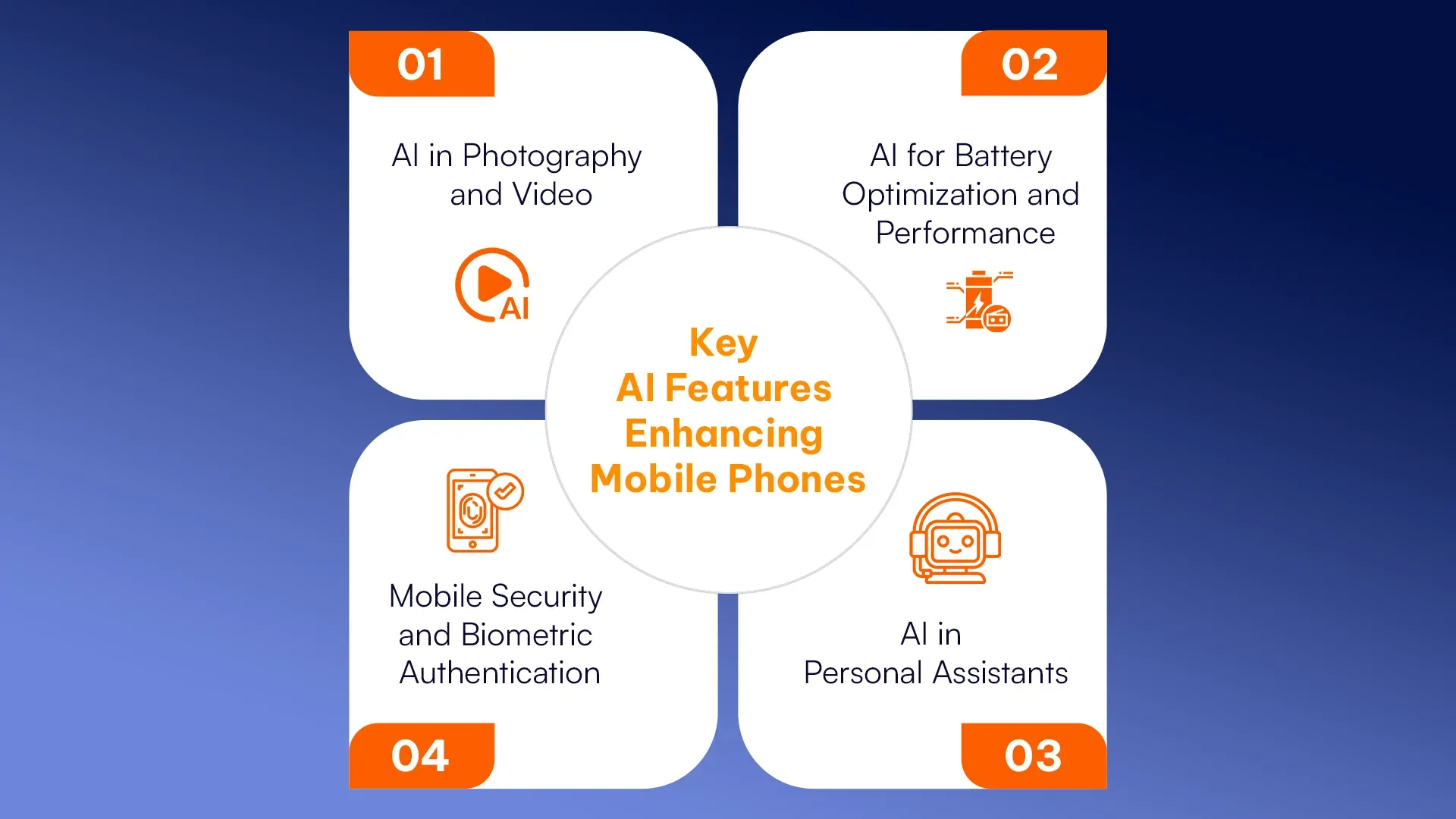
-
AI in Photography and Video
Modern smartphones are known for their AI-equipped camera and photography; rather, the core specification of Vivo, Google Pixel and Samsung phone models has given priority to AI camera and photography at the time of launching. AI cameras and smartphones have very good face detection and focus capabilities, so that even if the subject is moving, the stability of the camera is so good that the picture is clicked in very high quality. And the good thing about these cameras is that they also use very advanced sensors and intelligence to support low-light and night mode photography. AI smartphone cameras also make improvements in the photo even after it is clicked, such as improving picture quality, colour contrast and smoothing in the final processing so that the best results are obtained.
-
AI for Battery Optimization and Performance
AI helps smartphones manage battery life efficiently by analyzing user habits, app usage, and system performance. It automatically adjusts screen brightness, refresh rate, and background activity to conserve energy. Features like adaptive battery in Android and smart battery management tools in iOS use AI to extend battery life, prevent overheating, and improve overall device performance.
-
AI in Personal Assistants
AI smartphones are quite popular for their integrated AI voice assistants, Siri and Google are the best examples of it which uses NLP technology, so you can set reminders to alarms just on your voice commands, ask any question and answer from it, can do any task automatically like sending texts to someone or making a call and from checking the weather to listening to the latest news is also quite easy with AI personal assistants.
-
Mobile Security and Biometric Authentication
Due to AI intelligence, mobile security also increases a lot, because it makes facial recognition very easy and AI also eliminates loopholes by using its intelligence, by doing fingerprint pattern analysis and behavior biometrics analysis, in case of any unusual activity, AI can lock and secure the device so that its data remains safe and secure.
Also Read: What are AI voice agents? A Complete Guide
Benefits of AI Integration in Smartphones
We have learned the basics about what impact AI intelligence can have on smartphones and their features. Now, let’s get into a little more detail about what benefits you can get from integrating AI in smartphones.
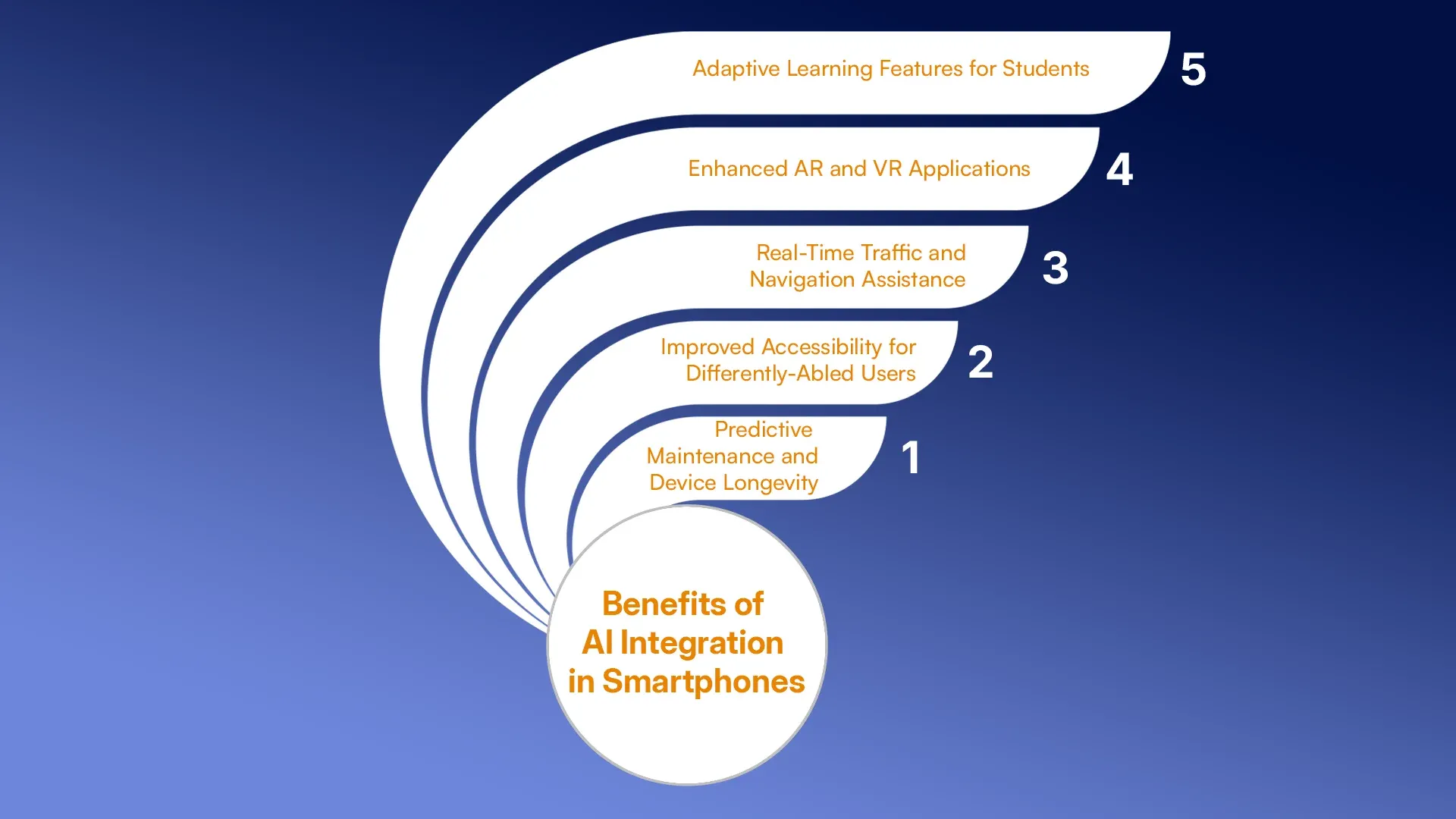
1. Predictive Maintenance and Device Longevity
AI intelligence analyzes the performance and optimization of the device and gives the user the facility to apply recommendations and settings accordingly. This is why AI can detect early signs of hardware or software failure, enabling proactive maintenance and updates to prevent breakdowns.
2. Improved Accessibility for Differently-Abled Users
AI intelligence is also very helpful for disabled people because they get the feature of real-time speech-to-text for the hearing impaired and voice commands for the visually impaired. Apart from this, they also get the feature of object recognition for better navigation.
3. Real-Time Traffic and Navigation Assistance
AI intelligence has access to your local maps, traffic and live data of Google maps, due to which it gives you the right road suggestions so that you can reach your destination in almost time without getting stuck in any traffic.
4. Enhanced AR and VR Applications
The future is going to belong to AR and VR devices for a long time. That is why modern AI supports AR and VR devices and applications, making real-time object detection easy. This has greatly improved the gaming, shopping and entertainment experience. AR and VR enhance virtual learning environments for students.
5. Adaptive Learning Features for Students
Many AI powered educational platforms and tools have arrived in the market, and new AI smartphones are integrated with many industry leading tools, which improve student learning and give students a customized learning path. AI platforms offer personalized quizzes and feedback to students. Apart from this, they can also provide real-time assistance and guidance to students.
Challenges of AI Implementation in Mobile Phones
As much as there are benefits of integrating AI in mobile phones, there are also challenges in integrating it. Let's get to know some major challenges.
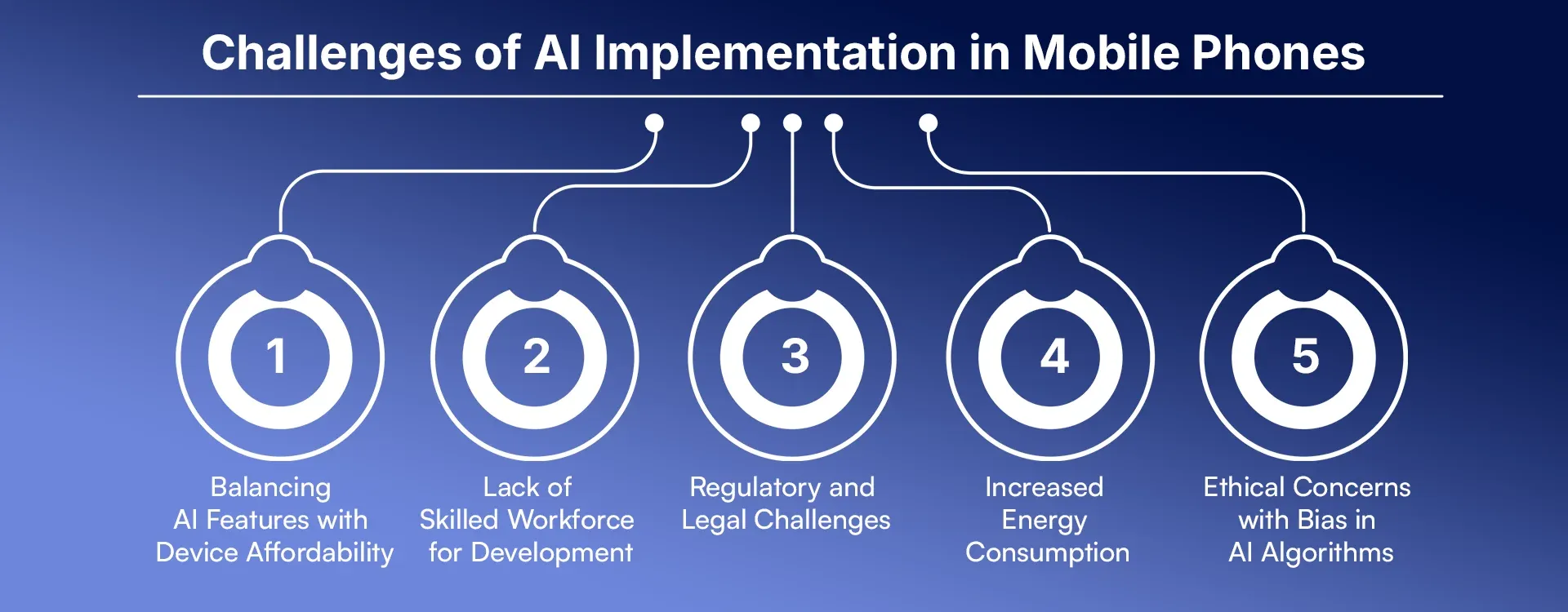
1. Balancing AI Features with Device Affordability
Advanced AI integration also requires premium and capable hardware because AI tools work on more advanced high processors, low hardware will have a negative impact on performance and device health, so when AI is integrated in a smartphone, its price becomes high, which makes those smartphones not affordable for many people, I personally analysed myself that whatever budget segment phones are available in the market, they do not have the facility of advanced AI integration, even by 2025, AI integration is only seen in expensive smartphone models.
2. Lack of Skilled Workforce for Development
Integrating AI into smartphones and developing efficient and ethical AI requires expertise in ML, data science, and embedded systems, which are in short supply globally. AI has evolved much faster due to which there is not enough skilled workforce or training courses available in the smartphone manufacturing industry to fulfil the demand.
3. Regulatory and Legal Challenges
With AI, smartphones also face many legal challenges, ranging from different licensing to court cases, as data privacy laws vary across countries. Hence, smartphone companies have to release smartphones and their features according to the rules of the country, which proves to be very challenging and costly, as this requires a lot of extra money on different software and their versions.
4. Increased Energy Consumption
AI intelligence is mostly not compatible with the devices of 2025 because AI intelligence consumes a lot of energy in processing, which has a lot of effect on battery and device performance and due to this, the issue of overheating is seen in many devices.
5. Ethical Concerns with Bias in AI Algorithms
AI systems trained on biased datasets can lead to unfair outcomes, especially in facial recognition or language processing. Due to so many races, cultures and beliefs in the world, launching a globally friendly smartphone with AI intelligence is a big challenge for most companies because they will have to do a lot of R&D and analyze the local market.
Applications of AI in Mobile Devices
Due to AI intelligence, what core applications do you get in smartphones? Let's try to know in a little detail and in simple language.
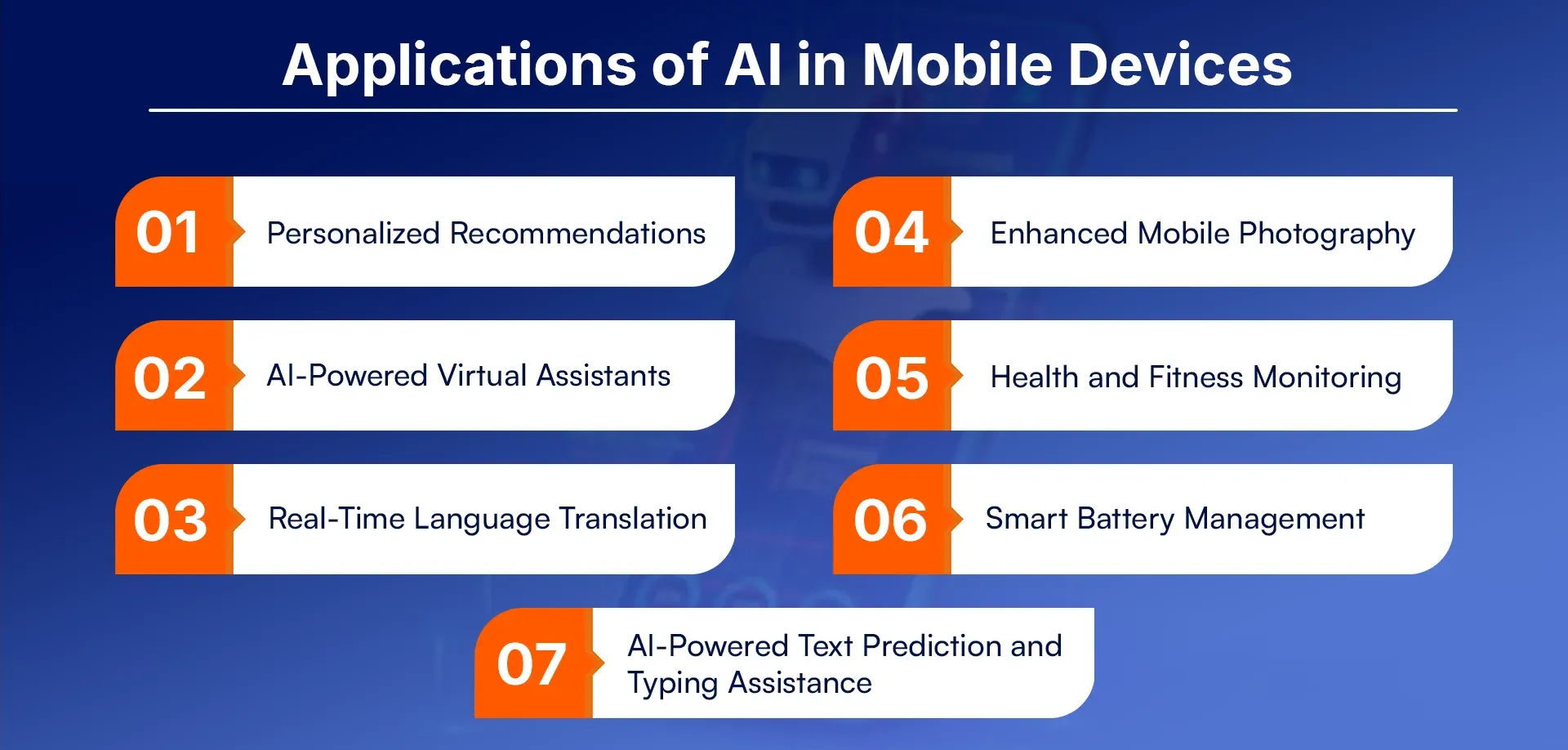
1. Personalized Recommendations
AI smartphones work a lot on personalized recommendations in which they try to give you suggestions for content, products, or services based on your browsing history, app usage, or time of the day.
2. AI-Powered Virtual Assistants
Google assistant, Siri and Alexa have also become quite advanced and since the release of Gemini AI of Android, it has replaced Google assistant from Android devices, which has brought many new capabilities in smartphones, and these personal assistants can understand natural language, give you features like real time language translation free of cost and can automate your daily tasks.
3. Real-Time Language Translation
The best thing about AI intelligence is that it has made communication very easy worldwide, and mostly AI-integrated smartphones have the feature of real time language translation, which can translate text, speech and image with embedded text in real time speedily in your favourite and preferred language, which makes communication very easy.
4. Enhanced Mobile Photography
As we already know that AI has a very positive impact on photography because AI intelligence cameras pay a lot of attention to the focus and clarity of the photo, due to which the exposure and colour of the picture remain quite balanced.
5. Health and Fitness Monitoring
Mostly AI devices focus a lot on health and fitness and they have a very good integration with fitness smartwatch and bands, using which they do a detailed analysis of your health and give suggestions accordingly, mostly after the integration of smartwatch with smartphones, step counting, heart rate monitoring and sleep tracking can be analysed very well and the health and fitness core in smartphones has become so popular that Samsung has even launched its AI powered galaxy health ring.
6. Smart Battery Management
These smartphones focus more on smart battery management, they hibernate unused apps and give suggestions for how much charging is required to prevent overheating.
7. AI-Powered Text Prediction and Typing Assistance
Nowadays, smartphone keyboards have also become quite advanced, Keyboards like Gboard and SwiftKey easily predict the next words, as they analyze your typing behaviour so much that they store your typing pattern, besides giving you autocorrect suggestions for word errors, and also offer emojis and GIFs based on context. Apple used AI to release the Genmoji feature in iOS 18.2, which is the best example of how AI intelligence can be used to make communication smoother and interesting.
Also Read: How Can AI Agents Help Automate Your Workflows in 2025
Key Use Cases of AI in Mobile Phones
There are many uses of AI intelligence integration in smartphones, and these uses vary from person to person, but let's know in detail about the key use cases of AI smartphone integration.
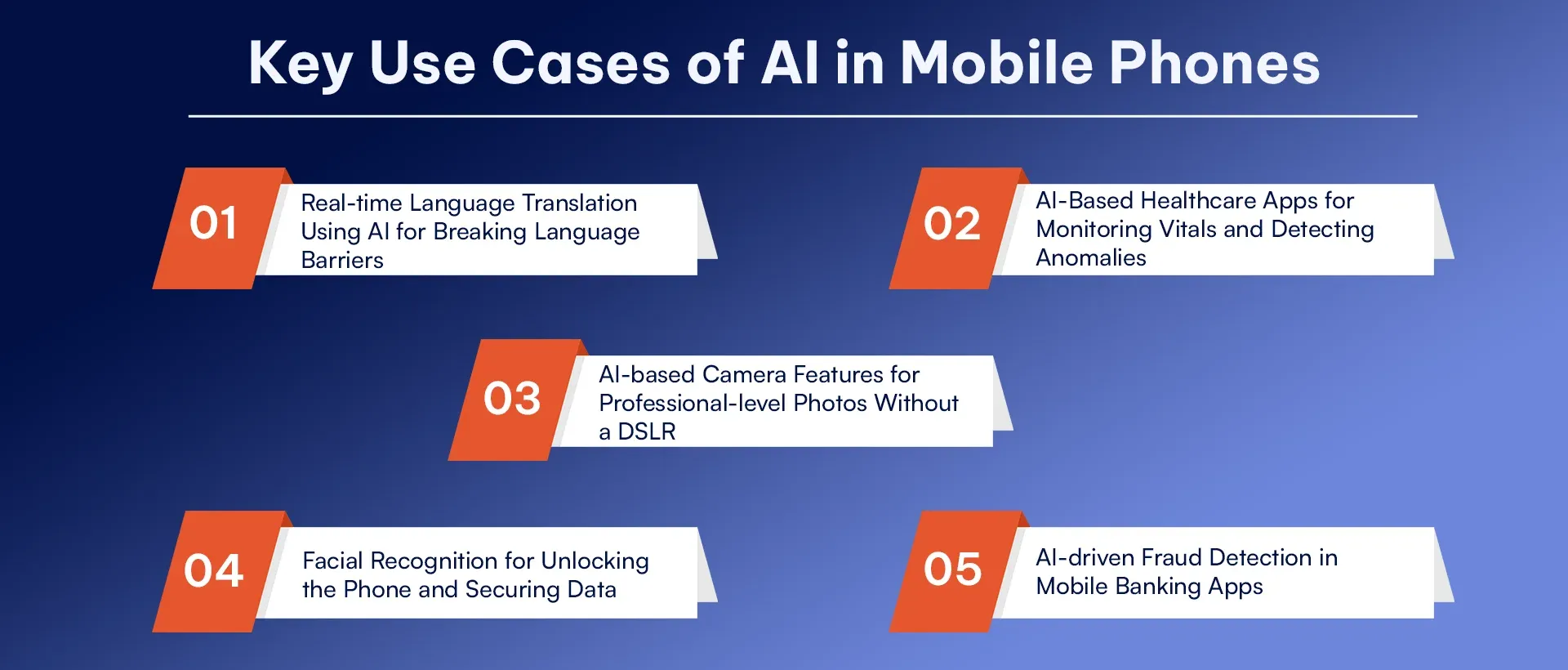
-
Real-Time Language Translation Using AI for Breaking Language Barriers
Apps like Google Translate use AI to instantly translate speech and text. This allows travellers and businesses to benefit from seamless multilingual communication. Google also launched a real-time translation feature in its latest Android 16 update for video conferencing, which is an AI powered feature.
-
AI-based Camera Features for Professional-level Photos Without a DSLR
Smartphones now come equipped with powerful AI-driven camera features that rival DSLR-quality photography. These include scene recognition, portrait mode, night mode, and real-time image enhancement. AI algorithms automatically adjust lighting, focus, and exposure based on the environment to deliver sharp, vibrant images. Features like background blur (bokeh), object tracking, and AI-based stabilization make it easy for users to capture studio-quality photos without needing professional gear.
-
AI-Based Healthcare Apps for Monitoring Vitals and Detecting Anomalies
Many advanced health care apps and default settings are available in AI smartphones, such as tracking heart rate, tracking blood oxygen, and it can predict potential health issues using real-time data analysis.
-
Facial Recognition for Unlocking the Phone and Securing Data
AI provides quick and secure login features to smartphones and has adaptive recognition under varying light and angles.
-
AI-driven Fraud Detection in Mobile Banking Apps
As we have already discussed that AI smartphones work on a lot of pattern and behaviour analysis, due to which it becomes very easy for them to detect any anomaly, and they can secure or lock the device in case of any suspicious activity. This provides an extra layer of security to financial transactions.
Future Trends of Artificial Intelligence in Mobile Phones
Smartphones will get the complete feature of AI intelligence in future, but right now it is only seen in limited premium segment smartphones because AI intelligence is still evolving according to the smartphone softwares and hardwares, so let’s get to know about its future trends which we can see in the smartphones of the next few years.

-
Augmented Reality for a More Immersive Experience
The future is going to be of AI + AR to a great extent because it can give real-time, personalized, and contextual digital overlays. From AR games to virtual shopping experiences, you will be able to do it.
-
AI and 5G Synergy for Faster, More Responsive Experiences
AI applications like video analytics and real-time processing will flourish with the high-speed, low-latency environment of 5G. As future smartphones come to market with advanced hardware and processors, AI capabilities and speed will increase even more.
-
AI-enhanced Wearables for Better Task Management
Future smartwatches and fitness bands will easily predict health issues with better accuracy and will also be able to give you suggestions accordingly.
-
Predictive Healthcare and Mobile Apps
Advanced AI integrated smartphones will predict diseases before symptoms appear and offer AI-driven telemedicine and consultation, and if the sensors of future smartphones become more advanced, they will be able to diagnose many diseases.
Conclusion
The use of AI in smartphones does not mean that you will get to see a multifunction mobile; its core aim is to make the core capabilities and technology of smartphones more advanced. AI will also play a big role in enhancing user experience and security as it works on user behaviour patterns, due to which the smartphone gets to know about the user behaviour of its owner, and whenever it sees any anomaly, it can restrict many features or even temporarily lock the smartphone.
Apart from this, AI smartphones help a lot in photography, personalised assistants, health monitoring, and educational sectors. Apart from this, if you want to move your business or work forward in the AI revolution, RejoiceHub provides insights, tools, and strategies tailored for this tech transformation. Whether you're a developer, a business owner, or a tech-savvy user, embracing AI now means leading the future tomorrow.
Frequently Asked Questions
1. What is AI in smartphones?
It refers to integrating artificial intelligence technologies like machine learning and natural language processing into smartphones to improve functionality, personalization, and efficiency. The reason for having multifunctionality is that it is integrated into the smartphone, and the mobiles follow NLP processing.
2. How does AI enhance smartphone photography?
AI-intelligent smartphones enhance photography by recognising scenes, adjusting settings automatically, improving low-light performance, and offering features like Portrait and Night Mode.
3. Can AI improve battery life in smartphones?
Yes, by optimizing app usage, adjusting screen settings, and managing background processes based on user behaviour. AI intelligence also gives personalized recommendations for smartphone battery optimization.
4. What are the privacy concerns with AI in phones?
AI systems often require data access to function effectively, which raises concerns about how that data is collected, stored, and used.
5. How does AI contribute to mobile security?
It increases security through facial recognition, fingerprint scanning, and behaviour-based authentication. AI helps protect sensitive data and prevent unauthorized access.
6. What is the future of AI in mobile phones?
The future includes integration with 5G, smarter AR/VR, predictive healthcare, edge computing, and more personalized, efficient interactions. As internet connectivity, smartphone hardware and AI models improve, the capabilities of AI smartphones will increase in the future.
7. Can AI in mobile phones drain battery faster?
Yes, AI processing can increase energy consumption, especially in older devices. However, modern smartphones use optimized AI chips and smart battery management systems to balance performance and efficiency.
8. How does AI enhance mobile security?
AI enhances security through facial recognition, fingerprint scanning, behavior analysis, and fraud detection in banking apps. It can detect unusual activities and automatically secure the device.
9. Why is AI important in modern smartphones?
AI is important because it makes smartphones smarter, faster, and more personalized. It improves user experience, security, efficiency, and accessibility across different applications.
10. Are AI features available in all smartphones?
Advanced AI features are mostly available in mid-range and premium smartphones. Budget smartphones may have limited AI capabilities due to hardware constraints.
